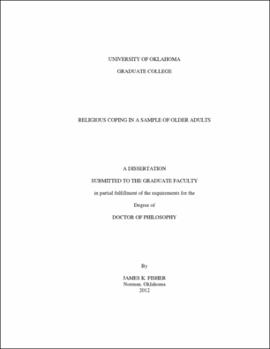| dc.description.abstract | The population of older adults is growing, and will continue to grow in the United States (Administration on Aging, 2003). Thus, the need to understand the experiences of the elderly and to intervene appropriately is becoming increasingly important. The elderly have consistently shown to be a more religious group overall and to gain more positive benefits from religion than their younger counterparts (Beit-Hallahmi & Argyle,1998; Pargament, 1997). This study aims to examine the role of religious coping, perceived stress, active coping, and existential well-being as a predictor of psychological quality of life in a sample of older adults. Findings show that, overall, the elderly tend to be a resilient group and experience high levels of existential well-being and low amounts of perceived stress. Using hierarchical multiple regression, positive religious coping emerged as a significant unique predictor of psychological quality of life above and beyond existential well-being, perceived stress, and active coping. These findings have great meaning for practitioners who should be attuned to the religious experiences and beliefs of their elderly clients. | |
